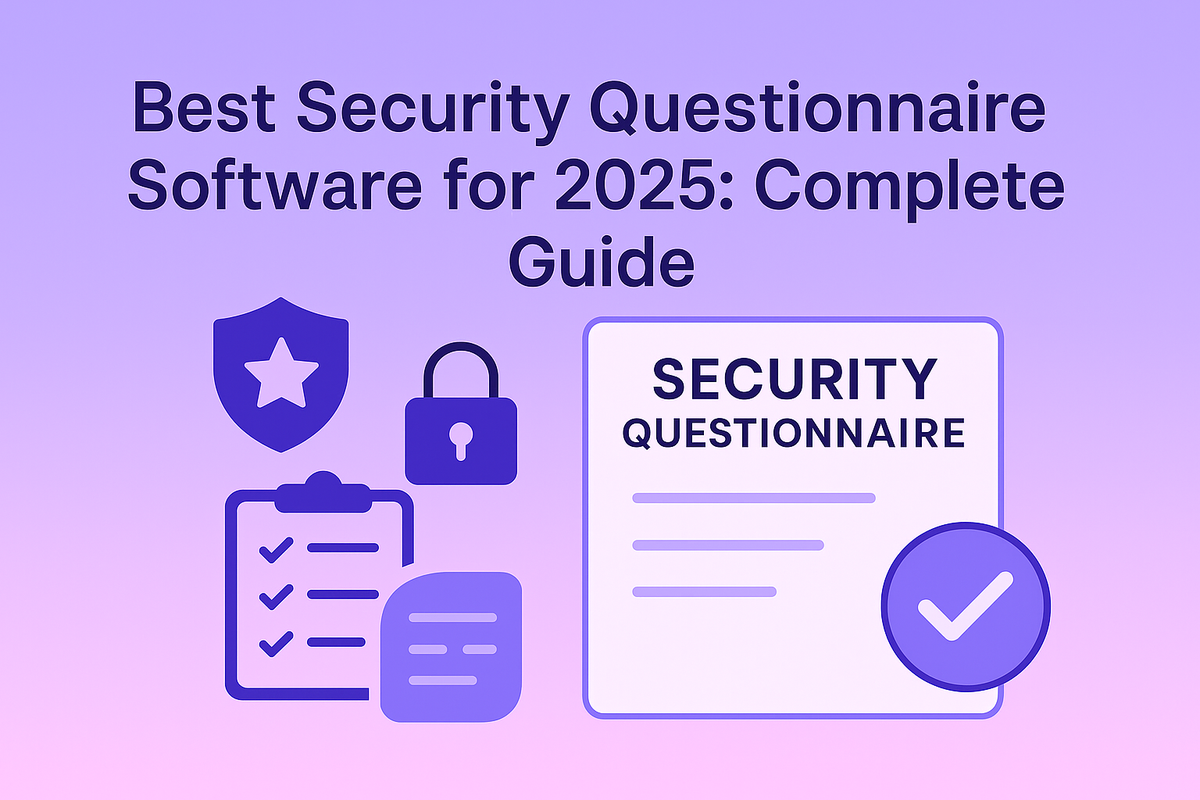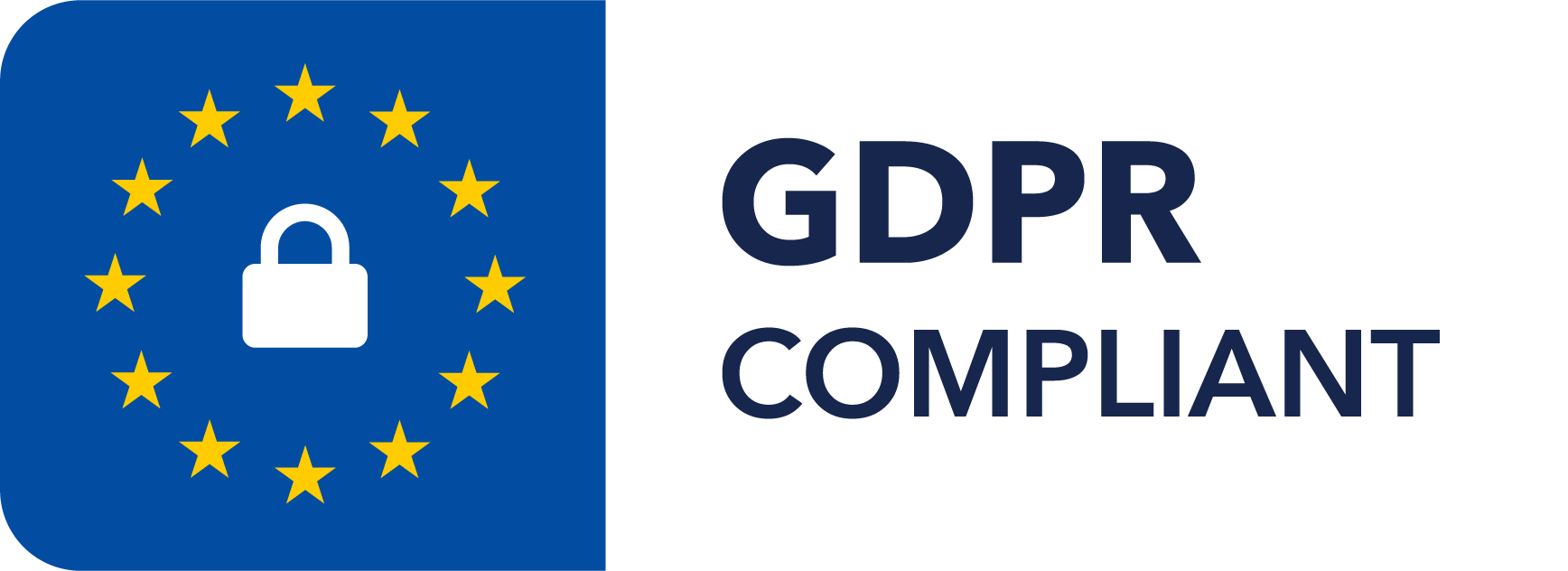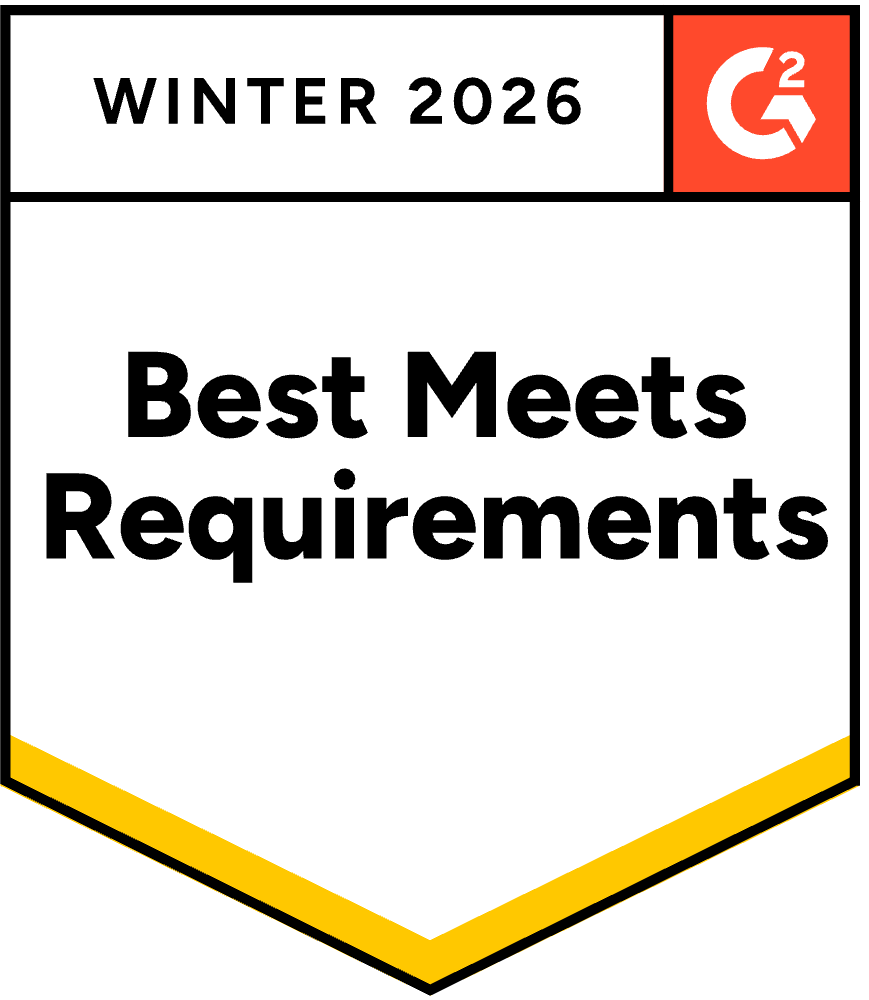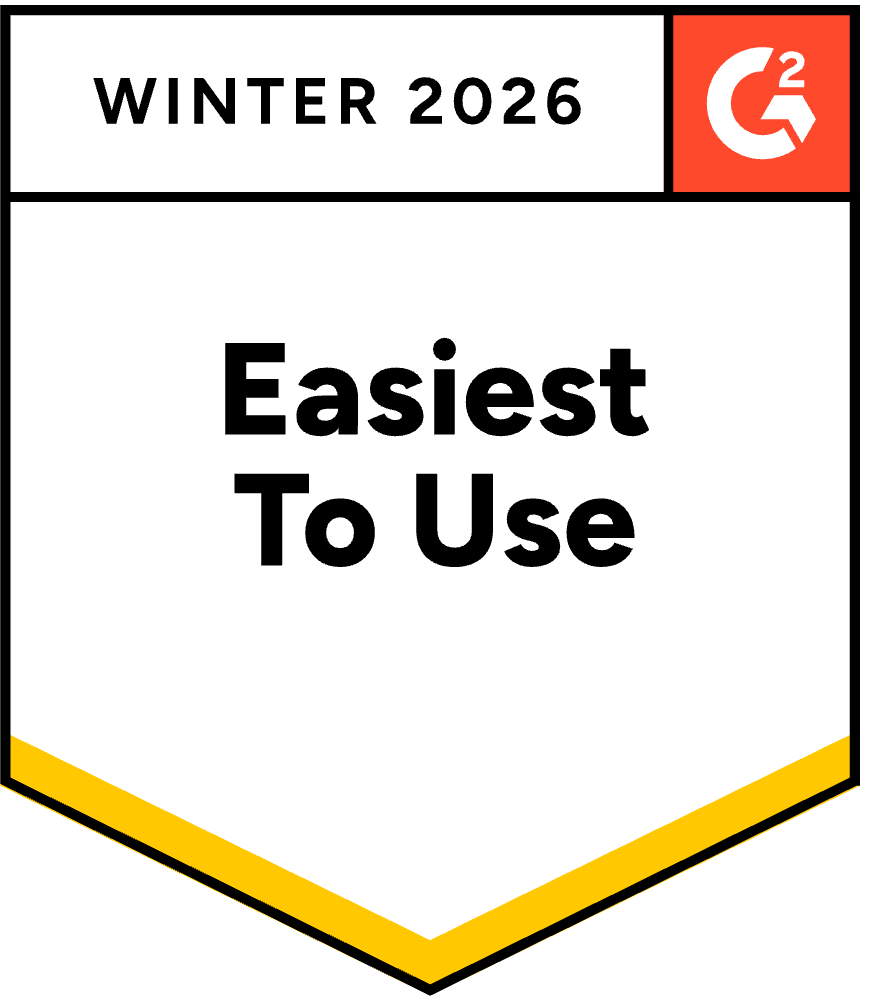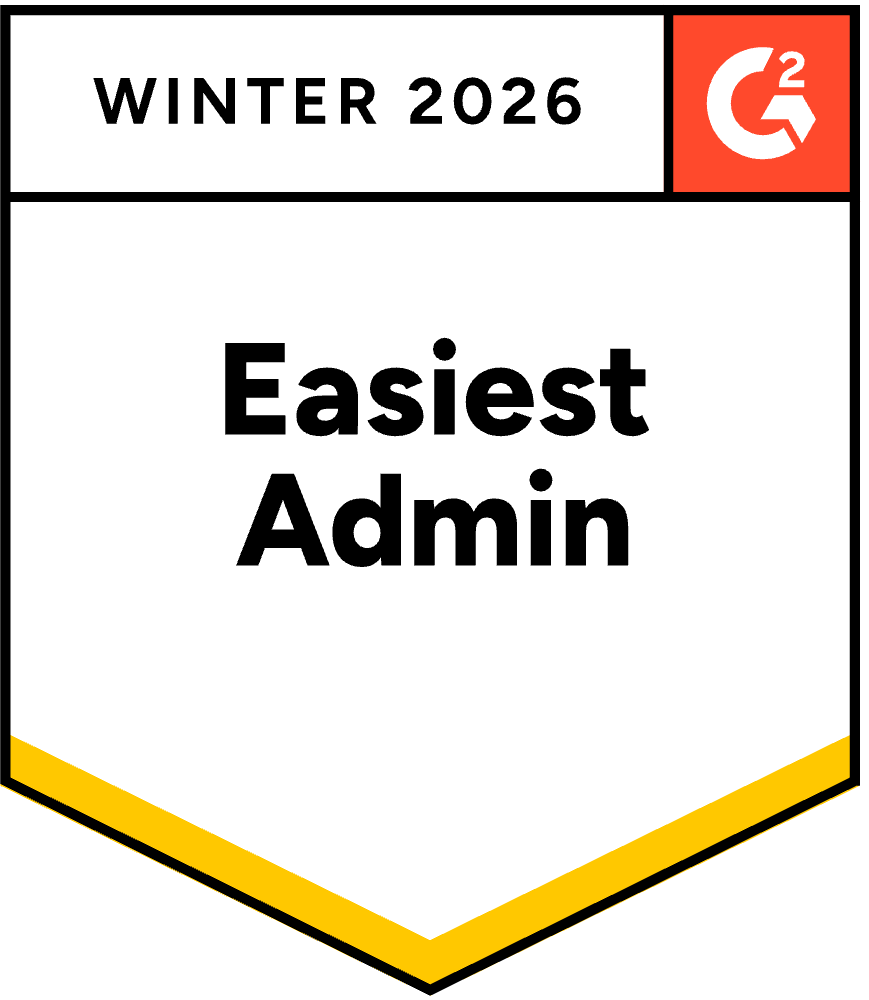8 Best AI Deal Desk Software Tools for 2025
August 19, 2025
By
Evie Secilmis
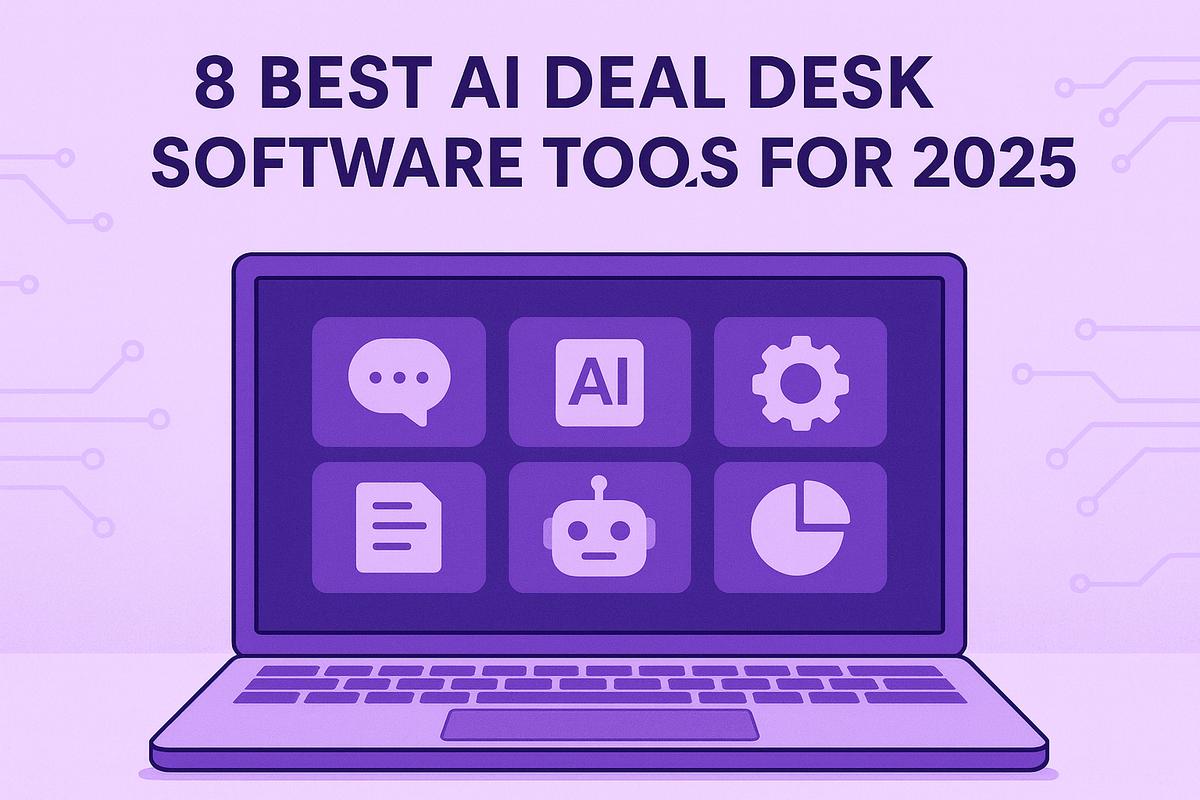
Think of your sales process as a high-performance engine. For your team to win, every part needs to work in perfect sync. But often, it’s bogged down by manual tasks, scattered information, and communication gaps that act like sludge in the system. This is where deal desk software comes in. These powerful deal desk tools act as the central control system for that engine, automating routine checks and getting every department—from sales to legal—perfectly synchronized. The result is a streamlined operation that lets your team focus on what they do best: crossing the finish line.
Key Takeaways
- Automate Repetitive Work to Focus on Selling: An AI deal desk handles the time-consuming tasks of drafting proposals, responding to RFPs, and managing documents, freeing your sales team to concentrate on building relationships and closing deals.
- Prioritize Integration and Problem-Solving Over a Long Feature List: The best platform is one that solves your team's specific bottlenecks and connects seamlessly with your existing CRM, creating a single source of truth without complicating your workflow.
- Plan Your Implementation for a Smooth Transition: Successful adoption hinges on a clear rollout strategy that includes hands-on training, communicating the direct benefits to your team, and tracking metrics like shorter sales cycles to prove the tool's value.
What is a Deal Desk?
At its core, a deal desk is a centralized team or function that acts as the mission control for your most complex sales deals. Think of it as a special task force that brings together experts from different departments—like sales, finance, legal, and operations—to make sure every part of a high-stakes deal is structured for success. Instead of sales reps running from department to department trying to get approvals and answers, they have a single point of contact. This team ensures that pricing is competitive yet profitable, contract terms are favorable, and the proposed solution is actually deliverable. It’s all about removing internal friction to create a smoother, faster path to closing big, non-standard deals that can define a quarter.
The primary goal is to standardize the process for non-standard deals. It sounds like a contradiction, but it’s about creating a reliable framework for handling complexity. By bringing key stakeholders together, a deal desk helps maintain consistency in pricing, prevent rogue discounting, and ensure compliance with company policies. This strategic alignment not only accelerates the sales cycle but also minimizes risk and improves the overall quality of the deals you close. It transforms a potentially chaotic process into a well-oiled machine, allowing your sales team to focus on what they do best: selling.
The Human Team Behind the Deal
The magic of a deal desk lies in its cross-functional nature. It’s not just a sales support function; it’s a strategic hub where different areas of expertise converge. The team typically includes representatives who can speak to the financial, legal, and operational implications of a deal. For instance, a finance expert will analyze profit margins and approve special pricing, while a legal team member reviews contract terms to mitigate risk. An operations or product specialist confirms that your company can deliver on its promises. This collaborative approach ensures that every deal is not only attractive to the customer but also sound for the business, preventing costly mistakes down the line.
Key Roles and Structure
Within the deal desk, each member plays a critical role. The sales rep is the champion of the deal, bringing the opportunity forward. The deal desk manager or analyst acts as the quarterback, coordinating the moving parts. They are responsible for reviewing the initial proposal, identifying potential roadblocks, and engaging the right experts. The finance representative scrutinizes the numbers, ensuring the deal aligns with revenue goals. Meanwhile, the legal expert pores over the contract, flagging non-standard clauses and ensuring compliance. This structure creates a system of checks and balances that supports, rather than hinders, the sales process.
Who Manages the Deal Desk?
The leadership of a deal desk often falls under the umbrella of Revenue Operations (RevOps), as its function is central to the entire revenue-generating process. In larger organizations, you might find a dedicated "deal desk manager" who oversees the day-to-day operations and reports to the head of RevOps or Sales Operations. This person is responsible for refining the deal desk workflow, training the sales team on when and how to engage the desk, and analyzing deal data to identify trends and areas for improvement. Their ultimate responsibility is to ensure the desk operates efficiently and effectively as a strategic partner to the sales team.
Deal Desk vs. Revenue Operations (RevOps)
It's easy to confuse the deal desk with Revenue Operations (RevOps), but they serve different functions. Think of it this way: the deal desk is tactical, while RevOps is strategic. A deal desk focuses on the specifics of individual, complex deals, working to structure and close them successfully. It’s the ground-level team that gets into the weeds of pricing, terms, and approvals for a single opportunity. RevOps, on the other hand, takes a bird's-eye view of the entire revenue engine. It’s responsible for the processes, systems, and data that support the entire customer lifecycle, from marketing to sales to customer success. The deal desk is a critical component *within* the broader RevOps strategy.
What Does "Desking a Deal" Mean?
When someone says they are "desking a deal," they are referring to the specific process of building, structuring, and finalizing a sales quote or proposal. This term is most common in industries with configurable products or complex pricing, like auto sales or enterprise software. It’s the hands-on work of putting the numbers together, applying discounts, factoring in trade-ins or special terms, and getting the necessary approvals before presenting the final offer to the customer. Essentially, it’s the administrative and strategic work that happens at the "desk" before a deal is officially closed.
The Deal Desk Process in Action
So, how does a deal desk actually work? It’s a structured workflow designed to bring order to the chaos of complex sales. The process begins when a sales rep identifies an opportunity that falls outside standard guidelines—perhaps it involves a new product configuration, multi-year terms, or significant discounts. Instead of trying to figure it out alone, the rep submits the deal to the desk for review. The deal desk team then takes over, analyzing the request, collaborating with relevant departments, and guiding the deal through the necessary approval stages. This ensures that every non-standard deal is vetted for profitability, feasibility, and risk before it reaches the customer, creating a consistent and reliable process for your most important sales.
Focusing on Complex and Non-Standard Deals
A deal desk isn’t meant for every single sale. Its true value shines when handling complex, high-value, or non-standard opportunities that carry greater risk and reward. If your business sells highly customized solutions or negotiates enterprise-level contracts, a deal desk is essential. These are the deals that can’t be managed with a standard price list and a simple contract template. They require careful consideration of pricing strategy, resource allocation, and long-term partnership terms. The deal desk provides the specialized attention needed to structure these deals properly, ensuring they are wins for both your customer and your company.
Examples of Deals Handled
What kind of deals are we talking about? Think about a multi-year software subscription that includes tiered pricing and volume discounts that change over time. Or a deal that requires bundling professional services with a product, which involves coordinating with a completely different team on scope and cost. Other examples include proposals that involve non-standard legal terms, requests for extended payment schedules, or competitive bids that require aggressive, but still profitable, pricing. These are the types of deals that, if handled poorly, can lead to lost revenue or unhappy customers.
The Four-Step Deal Desk Workflow
Most deal desks follow a clear, four-step process to ensure consistency and efficiency. This workflow provides a predictable path for sales reps and ensures that all necessary checks and balances are completed. By standardizing how these unique deals are handled, you can accelerate the sales cycle while simultaneously reducing errors and risk. This structured approach is what allows sales teams to confidently pursue larger and more complex opportunities.
1. Intake and Review
The process kicks off when a sales rep submits a deal to the desk. This is often done through a dedicated form or directly within their CRM system. The submission includes all relevant details about the opportunity, the customer's needs, and the proposed terms. The deal desk team then conducts an initial review to understand the request, check for completeness, and identify which stakeholders need to be involved. This first step is crucial for triaging requests and setting the stage for a smooth process.
2. Cross-Functional Collaboration
Once the deal is reviewed, the deal desk analyst facilitates collaboration between the necessary departments. They will loop in finance to validate the pricing model, consult with legal to review any custom contract language, and connect with product or service delivery teams to confirm feasibility. This is where the deal desk acts as a central hub, ensuring all parties are aligned and have provided their input. This collaborative phase prevents silos and ensures a holistic review of the deal's potential impact on the business.
3. Approvals and Finalization
With input from all stakeholders, the deal desk guides the proposal through the formal approval process. This might involve a multi-level approval chain, from the sales manager all the way up to the CFO, depending on the deal's size and complexity. Using software can streamline this stage significantly, automatically routing requests to the right people and tracking progress. Once all approvals are secured, the deal desk finalizes the official quote and contract for the sales rep to present to the customer.
4. Handoff and Documentation
After the customer signs on the dotted line, the deal desk’s job isn’t quite done. They ensure a clean handoff to the teams responsible for implementation, billing, and customer success. This includes documenting all the unique terms and agreements so that everyone is on the same page post-sale. The desk also archives the deal information, which becomes a valuable resource for analyzing trends, refining sales strategy, and improving the deal desk process itself over time.
The Strategic Importance of a Deal Desk
Implementing a deal desk is more than just an operational tweak; it's a strategic move that can have a profound impact on your business. By centralizing the management of complex deals, you create a scalable process that supports growth. It allows your sales team to be more ambitious, pursuing larger and more strategic accounts with the confidence that they have a support system to help them structure winning proposals. Furthermore, the data collected by the deal desk provides invaluable insights into sales performance, pricing effectiveness, and negotiation trends, enabling leadership to make more informed decisions about the business.
A well-run deal desk directly contributes to key business metrics. It can shorten sales cycles by removing internal bottlenecks, increase average deal size by enabling reps to construct more valuable solutions, and improve win rates by ensuring proposals are competitive and well-structured. An AI deal desk solution can amplify these benefits, automating the tedious parts of proposal generation and information gathering. This allows the human experts on your deal desk to focus on high-level strategy and negotiation, turning a support function into a powerful engine for revenue growth.
Which Businesses Benefit the Most?
While any company can benefit from a more organized sales process, deal desks are particularly vital for B2B businesses with complex sales cycles. If you sell configurable products, enterprise software, or high-value services, a deal desk is practically a necessity. Companies that frequently respond to detailed RFPs, negotiate multi-year contracts, or offer customized solutions will see the most significant return on investment. It’s also a game-changer for fast-growing companies looking to scale their sales operations without sacrificing deal quality or profitability.
Why a Deal Desk is a Strategic Must-Have
In a competitive market, speed and accuracy are everything. A deal desk provides both. By establishing clear rules, automating workflows, and leveraging smart tools, businesses can close deals faster and with fewer errors. This operational efficiency translates directly into a better customer experience, as clients receive well-thought-out proposals more quickly. Strategically, a deal desk protects your margins by preventing unauthorized discounting and ensures that you're only signing deals that are healthy for the business long-term. It’s a critical function for sustainable growth.
Key Benefits for Legal and Sales Teams
The relationship between sales and legal can often be strained, but a deal desk acts as a bridge between the two. For legal teams, it provides a controlled environment where they can pre-approve contract templates and clauses, empowering sales reps to handle more standard negotiations on their own. This frees up legal resources to focus only on the truly unique and high-risk issues. For sales teams, the benefits are clear: faster turnaround times, expert guidance on deal structuring, and a higher likelihood of getting their deals approved without endless back-and-forth. It’s a win-win that fosters collaboration and accelerates revenue.
What is an AI-Powered Deal Desk?
Think of an AI-powered deal desk as a smart upgrade to your sales team’s mission control. It’s a centralized system that uses artificial intelligence to automate and streamline the entire sales process, from creating proposals to getting approvals. Instead of just being a place to store information, an AI deal desk actively helps you win more business. It can generate first-draft responses to RFPs in minutes, suggest the most effective content for a proposal, and handle the tedious administrative tasks that slow your team down.
The goal is to free your sales reps from repetitive work so they can spend more time doing what they do best: building relationships and closing deals. By automating key parts of the sales cycle, these platforms help you respond to opportunities faster, maintain consistency across your documents, and make data-driven decisions. An effective AI deal desk doesn't just organize your sales process; it makes it smarter and more efficient, giving your team the tools it needs to consistently perform at its best. You can explore some of these core platform capabilities to see how they work in practice.
How AI is Changing Deal Management
Not long ago, managing a deal involved a messy combination of spreadsheets, email chains, and shared documents. Sales reps spent countless hours manually pulling information, chasing down approvals from legal or finance, and formatting proposals. This process was not only slow but also prone to human error, leading to inconsistent pricing and outdated information. The focus was on administrative box-checking rather than strategic selling. Today, AI has completely changed the game. It automates the grunt work, allowing sales teams to move faster and focus on high-value activities. This shift means your team can dedicate more energy to understanding customer needs and crafting winning strategies.
Breaking Down an AI Deal Desk
When you start looking at different AI deal desk solutions, you'll notice they share a few core components. A user-friendly interface is a must—your team won't use a tool that’s difficult to manage. Strong integration capabilities are also critical, as the software needs to connect seamlessly with your CRM and other sales tools. Look for intelligent document processing that can read and understand RFPs or security questionnaires, and smart analytics that provide insights into your deal pipeline. The best systems use AI to analyze historical data to recommend optimal pricing and can automatically route deals to the right people for approval, cutting down wait times from days to hours.
What Should You Look For in Deal Desk Software?
When you start looking at AI-powered deal desk solutions, you'll notice they aren't all built the same. The right platform can completely transform your sales process, but the wrong one can just add another layer of complexity. To cut through the noise, focus on solutions that offer tangible benefits and solve your team's most pressing challenges. A great deal desk isn't just a document repository; it's a strategic partner that helps you close deals faster and more efficiently. It should integrate smoothly with the tools you already use, like your CRM, and provide a single source of truth for every deal. The goal is to find a platform that not only streamlines your current workflow but also scales with you as your team and deal volume grow. From generating proposals in minutes to providing the analytics you need to forecast accurately, the right software empowers your team at every stage of the deal cycle. It should feel less like another piece of software to manage and more like an intelligent assistant that anticipates your needs and helps you stay ahead of the competition. Here are the essential features you should have on your checklist.
Generate Proposals in Minutes
The single biggest time-saver a deal desk can offer is automating proposal creation. Instead of starting from scratch every time, your team should be able to generate a complete, accurate first draft in minutes. The best AI uses your existing content and data to build tailored responses for RFPs, SOWs, and security questionnaires. This frees up your sales reps from hours of administrative work, allowing them to focus on what they do best: building relationships and selling. This isn't just about speed; it's about consistency and quality, ensuring every proposal that goes out the door is polished and professional.
Intelligent Document Management
A smart deal desk does more than just store your documents; it understands them. Look for a solution that can intelligently parse incoming requests, identify key questions, and pull the most relevant, up-to-date answers from your knowledge base. It should act as a central nervous system for all your sales content, from case studies to technical specifications. The AI should also be proactive, flagging outdated information across your connected systems to prevent inaccurate data from ever reaching a prospect. This intelligent document management ensures your team always has the right information at their fingertips.
Optimize Your Pricing Strategy
Pricing can make or break a deal. An advanced AI deal desk can help you get it right by analyzing historical sales data to recommend optimal pricing and discount structures. By looking at past wins, deal sizes, and customer segments, the system can provide data-backed guidance on what pricing strategy is most likely to succeed. This moves your team away from guesswork and toward a more strategic approach to quoting. It helps you protect your margins while remaining competitive, ensuring you’re not leaving money on the table or pricing yourself out of a deal.
Get Real-Time Sales Analytics
You can't improve what you can't measure. A top-tier deal desk solution must provide clear, real-time analytics on your entire sales process. It should give you a dashboard view of deal velocity, win rates, and bottlenecks in your workflow. This visibility helps sales leaders make smarter, data-driven decisions. You can see which proposals are moving forward, where deals are getting stuck, and how your team is performing against its goals. These sales analytics are crucial for forecasting accurately and continuously refining your sales strategy for better results.
Foster Seamless Team Collaboration
Winning complex deals is a team sport. Your deal desk software should be a central hub where sales, legal, finance, and product experts can work together seamlessly. Look for features that facilitate easy communication, clear approval workflows, and version control. The right tool breaks down departmental silos and ensures everyone is on the same page. When your legal team can quickly review a contract or a solution engineer can add technical details directly within the platform, you eliminate the endless email chains and delays that can kill a deal’s momentum. This kind of cross-functional collaboration is essential for moving quickly and presenting a united front to the customer.
Ensure Data Security and Compliance
In any sales process, you're handling sensitive company and customer information. Because of this, security can't be an afterthought. Ensure any deal desk solution you consider has robust security features to protect your data. This includes everything from access controls and encryption to compliance with industry standards like SOC 2 and GDPR. Your customers trust you with their information, and your deal desk platform must uphold that trust. A secure system not only protects you from breaches but also demonstrates a commitment to professionalism that can be a key differentiator during the sales cycle.
Our Top 8 Picks for AI Deal Desk Tools
Finding the right AI deal desk software can feel overwhelming, but it really comes down to understanding what each platform does best. Some tools are built for specific ecosystems, while others offer unique features like automated video demos or content generation. To help you sort through the options, I’ve put together a list of the top solutions that sales teams are using to streamline their work and close deals faster. Let's look at what makes each one stand out.
HeyIris.ai
If your team spends a significant amount of time responding to RFPs, RFIs, and security questionnaires, HeyIris.ai is designed for you. This platform excels at quickly generating accurate, high-quality first drafts for complex sales documents. Its core strength is its ability to connect to your existing systems, find the most relevant information, and even flag outdated content proactively. This means your team can stop digging through old files and focus on strategy. The Iris platform is built to reduce the manual workload, helping you increase your deal volume and win rates without burning out your team.
Salesforce Einstein
For teams already living and breathing in the Salesforce ecosystem, Salesforce Einstein is a natural fit. It’s not a standalone deal desk but rather an AI layer that integrates directly into your existing Salesforce setup. Einstein provides smart predictions, lead scoring, and opportunity insights right where your team is already working. Think of it as a way to make your current CRM smarter. It helps you prioritize the best leads and understand which deals are most likely to close, making it a powerful addition for any business heavily invested in the Salesforce platform.
HubSpot Sales Hub
Similar to Salesforce Einstein, HubSpot Sales Hub is the go-to choice for teams that use HubSpot's CRM. It’s an all-in-one solution that brings AI-powered tools directly into your sales process. Sales Hub helps with everything from email outreach and tracking to lead scoring and sales automation. It’s designed to give your team a complete view of the customer journey and provide the tools needed to engage prospects effectively. If your sales and marketing efforts are already centered around HubSpot, this hub provides a seamless way to add AI capabilities to your workflow.
Consensus
Consensus takes a unique approach by focusing on the buyer experience. This platform specializes in creating automated, personalized video demos that allow prospects to learn about your product on their own terms. Instead of a one-size-fits-all presentation, Consensus lets buyers choose the features they’re most interested in, creating an interactive and engaging experience. This empowers your champions to sell internally and gives your sales team valuable data on what matters most to each prospect. It’s a great tool for teams that want to stand out and let the product speak for itself.
Regie.ai
Think of Regie.ai as an AI writing assistant specifically for your sales team. This tool helps you create consistent, on-brand sales content at scale. It can generate personalized sales emails, social media posts, and even call scripts based on your target audience and campaign goals. This is incredibly helpful for maintaining a unified voice across your entire team and ensuring every communication is polished and effective. If you’re looking to improve the quality and consistency of your outreach, Regie.ai provides the AI-powered content creation tools to make it happen.
DealHub
DealHub is a robust platform built for managing the entire deal lifecycle, from proposal to close. It’s particularly strong for organizations with complex pricing structures, as it includes a Configure, Price, Quote (CPQ) tool. DealHub streamlines the creation of proposals, manages contracts, and automates approval workflows, all in one place. This helps eliminate bottlenecks and ensures that every deal moves forward smoothly and accurately. For teams that struggle with complicated quotes and lengthy approval processes, DealHub offers a centralized solution to keep things organized and efficient.
DealDesk AI
Tailored specifically for fast-growing SaaS companies, DealDesk AI by Subskribe is designed to simplify and accelerate the deal-making process. It focuses on creating a frictionless experience for both the sales team and the customer. The platform helps automate the creation of quotes and order forms, making it easier to manage subscriptions, renewals, and amendments. By streamlining these critical but often time-consuming tasks, DealDesk AI allows SaaS sales teams to close deals faster and focus more on building customer relationships rather than getting bogged down in paperwork.
Relevance AI
Relevance AI uses intelligent automation through "AI agents" to handle complex sales operations. Its Deal Desk Manager agents can analyze historical deal data to provide insights, manage approval workflows, and ensure compliance throughout the sales cycle. This tool is great for teams that want to offload repetitive tasks to AI and use data to make smarter decisions. By automating key parts of the deal desk function, Relevance AI helps accelerate deal velocity while freeing up your team to concentrate on more strategic activities that require a human touch.
Why Your Sales Process Needs an AI Deal Desk
Adopting an AI-powered deal desk is about more than just adding a new tool to your tech stack; it’s about fundamentally changing how your sales team operates. It shifts the focus from tedious administrative work to the high-impact, strategic activities that actually close deals. Instead of getting bogged down by paperwork, your team can concentrate on building relationships and understanding customer needs. This technology automates the repetitive parts of the sales cycle, provides data-backed insights for better decision-making, and creates a more cohesive, efficient workflow. The result is a sales process that’s not only faster but also smarter and more aligned with both your team's and your customers' goals. Let's look at the specific ways an AI deal desk can transform your sales process.
Streamline Your Entire Deal Flow
Think about all the manual steps involved in moving a deal forward: drafting proposals, filling out security questionnaires, getting approvals from legal and finance, and tracking everything in your CRM. An AI deal desk automates these tasks, creating a smooth, predictable path from initial contact to a signed contract. The right AI platform can generate first drafts of complex documents like RFPs and SOWs in minutes, not hours. It can also automatically route deals for approval based on preset rules, eliminating the need to chase down signatures. This streamlined process reduces friction, minimizes the risk of human error, and shortens your sales cycle, allowing your team to manage more deals at once without getting overwhelmed.
Make Smarter Decisions, Faster
Making the right call on pricing, discounts, and contract terms can be the difference between winning and losing a deal. An AI deal desk acts as an intelligent advisor, drawing on historical data from all your past deals to guide your decisions. It can analyze which responses in previous RFPs led to wins and suggest the most effective answers. By learning from your sales history, the AI can also recommend optimal pricing strategies that protect your margins while remaining competitive. This means your team isn't just guessing; they're making data-driven choices in real-time, leading to more profitable agreements and higher win rates.
Maximize Your Team's Efficiency
Your sales reps are at their best when they're talking to customers, not when they're buried in paperwork. An AI deal desk handles the time-consuming, repetitive tasks that drain your team's energy and focus. It can automatically populate lengthy documents, find the most up-to-date information from your knowledge base, and ensure every proposal is accurate and consistent. By offloading this administrative burden, you give your sales team more time to dedicate to building relationships, conducting demos, and strategizing on key accounts. This shift doesn't just make your team more productive; it also improves job satisfaction by letting them focus on the work they truly enjoy.
Create a Better Customer Experience
A clunky, slow sales process doesn't just frustrate your team—it also creates a poor experience for your potential customers. When responses are quick, accurate, and personalized, it shows that you're professional and attentive. Some AI deal desks can even create customized online "sales rooms" for each client, providing a central hub with all the relevant documents, presentations, and communications. The system can track how customers engage with these materials, giving your sales team valuable insights into what they care about most. This allows for more targeted and effective follow-ups, making the entire buying journey feel seamless and tailored to the customer's needs.
Use Data to Drive Your Sales Strategy
Beyond just executing tasks, an AI deal desk provides a wealth of data that can inform your entire sales strategy. It offers a clear view of your deal pipeline, highlighting potential bottlenecks and showing you what a winning deal cycle looks like. The AI can analyze trends to provide insights into which strategies are working and where there's room for improvement. It also helps with governance by ensuring every deal complies with company policies and legal requirements, reducing risk across the board. By turning raw sales data into actionable intelligence, you can continuously refine your approach and build a more predictable, successful sales motion.
Best Practices for Managing a Deal Desk
Implementing an AI deal desk is a huge step forward, but the technology itself is only half the equation. To truly get the most out of it, you need a solid operational framework. Without clear rules of engagement, even the smartest platform can’t prevent confusion or delays. Establishing a set of best practices ensures that every deal is handled with consistency and speed, turning your deal desk from a simple support function into a strategic engine for growth. These guidelines create alignment across your sales, legal, and finance teams, manage expectations, and build a foundation for continuous improvement.
Standardize Your Processes
Consistency is the key to an efficient sales motion. When your team follows a clear, repeatable process for every deal, you eliminate guesswork and ensure nothing falls through the cracks. Start by creating standard templates for your most common documents, such as proposals, contracts, and SOWs. This not only speeds up document creation but also maintains brand consistency and reduces legal risk. An AI-powered platform is perfect for this, as it can manage and automatically populate these templates with accurate, up-to-date information. You should also map out a step-by-step workflow that defines how deals are submitted, reviewed, and approved, so everyone knows their role and what’s needed to move forward.
Set Clear Expectations with SLAs
Uncertainty is a deal killer. A Service Level Agreement (SLA) is your best tool for preventing it by setting clear, agreed-upon timelines for your deal desk operations. This is your promise to the sales team, defining how quickly they can expect a response, a contract review, or a final proposal. A good SLA should also outline a process for prioritizing urgent or high-value deals, ensuring your most critical opportunities get the attention they need. When your sales reps know they can count on a 48-hour turnaround for a standard contract, they can set realistic expectations with customers and keep the momentum going, building trust between teams and preventing deals from stalling.
Document Everything to Build a Playbook
Every deal that passes through your desk is a source of valuable data. By keeping detailed records of all terms, pricing decisions, and final agreements, you create an invaluable knowledge base for your entire organization. This documentation becomes the foundation of your sales playbook—a living guide that captures what works and what doesn't. It helps new reps get up to speed faster and allows the whole team to learn from past wins and losses. This historical data is also the fuel for an AI deal desk. The more information a system like Iris has to analyze, the smarter its recommendations on pricing and proposal content become, helping you refine your strategy with every deal you close.
How to Choose the Right AI Deal Desk Software
Finding the right AI deal desk software is less about picking the one with the most features and more about finding the one that fits your team's workflow like a glove. With so many options out there, it’s easy to get distracted by flashy demos. To cut through the noise, focus on what will actually make a difference for your sales process. Think about your biggest bottlenecks right now. Is it the time it takes to create a proposal? Is it keeping documents organized? Or is it getting accurate data for forecasting? Let’s walk through the key things to consider so you can choose a tool that your team will love and that will deliver real results.
First, Pinpoint Your Team's Needs
Before you even look at a demo, sit down with your team and map out your must-haves. What does your ideal sales process look like? The right software should feel like a natural extension of your team, not another complicated tool to learn. Make a list of your non-negotiables. For example, it should be easy for your sales team to use and learn, and it needs to connect with your existing CRM and email. Also, think about how you’ll measure success. Are you aiming for faster proposal times, more accurate quotes, or higher win rates? Knowing your goals upfront will make it much easier to spot the perfect solution when you see it.
Check for Must-Have Integrations
A new tool should simplify your tech stack, not complicate it. The last thing you want is a powerful piece of software that doesn’t talk to your other systems. Seamless integration is crucial for maintaining your workflow and keeping your data consistent. Make sure the deal desk software can connect smoothly with your existing software, especially your CRM. This ensures that information flows freely between platforms, saving your team from tedious manual data entry. It’s also a matter of security. A well-integrated system helps protect your sensitive company and customer information by keeping it within a secure, connected environment instead of scattered across different, siloed apps.
Decode the Pricing Models
It’s tempting to compare software based on the monthly subscription fee, but that number rarely tells the whole story. Instead of focusing only on the price tag, think about the return on investment (ROI). Calculate the total cost and weigh it against how much time and money the tool will save you. How many hours will your team get back each week? How will faster, more accurate proposals impact your revenue? A slightly more expensive tool might offer a much greater return by closing more deals. Look at case studies from companies similar to yours to see the tangible value others are getting.
Don't Forget Support and Training
The most powerful software in the world is useless if your team doesn’t use it. That’s why support and training are so important. When you’re evaluating options, ask about their onboarding process. Do they offer live training, or will you be on your own with a library of help articles? The best tools are designed for quick adoption, often with short, focused training sessions that get your team up and running fast. The goal is to show your team how the tool will make their jobs easier, not add another task to their to-do list. Good support means having a partner you can call on when you have questions.
Choose a Solution That Scales With You
You’re not just choosing a tool for today; you’re investing in a solution that should grow with your business. AI technology is evolving quickly, and your deal desk software should, too. Look for a provider that has a clear vision for the future and is continuously improving its product. Tomorrow’s AI will do more than just automate tasks—it will understand context and suggest better ways to work, making your sales forecasts more accurate and insightful. Choosing a forward-thinking partner ensures your sales process will stay ahead of the curve. For a deeper look at what's coming, a whitepaper on AI's future can offer valuable insights.
Implementing a Deal Desk: Your Step-by-Step Guide
You’ve picked your software. Now comes the part that can feel a little daunting: getting it up and running. A smooth implementation is totally achievable with a clear plan. It’s not just about flipping a switch; it’s about integrating the tool into your team’s daily workflow so it actually makes a difference. Breaking it down into manageable steps—from the technical setup to measuring your success—will help you get the most out of your new investment without the headaches. Let's walk through how to do it right.
Step 1: The Technical Setup
This is where the rubber meets the road. Connecting a new AI tool with your existing sales systems, like Salesforce or your CRM, is the first big step. It can seem tricky, especially if your data is spread across different places. The key is to work with your new software provider to map out the integration points. A good platform is designed to connect with the tools you already use. Focus on creating a clean connection from the start to ensure information flows smoothly between systems. This initial effort prevents data silos and ensures your team has everything they need in one place.
Step 2: Migrating Your Data
The thought of migrating all your content—past proposals, Q&A pairs, and product info—can be overwhelming. Here’s the good news: you don’t need a perfectly organized content library to get started. In fact, the process of setting up your new AI deal desk will help you get organized. The software is designed to ingest and structure your information, making it easily searchable. Start by identifying your most important and frequently used documents. This initial data load gives the AI a solid foundation to learn from, and you can continue to add and refine your content library over time.
Step 3: Training Your Team for Success
A new tool is only as good as the team using it. The most important part of training is showing your sales reps how this software makes their jobs easier. Don't just focus on the features; focus on the benefits. Frame it as a way to eliminate tedious tasks, respond to RFPs faster, and ultimately, close more deals. Run hands-on training sessions with real-world examples they’d encounter every day. When your team sees firsthand that the tool helps them win, adoption will follow naturally. Highlighting real success stories can also show them what’s possible.
Step 4: Managing the Transition
Let’s be real: sales teams often have their tried-and-true methods, and change can be met with resistance. The key to a smooth transition is clear communication and a solid change management plan. Start with a small pilot group of enthusiastic team members. Their success and positive feedback will create momentum and encourage others. Make sure everyone understands the "why" behind the change—not just the "how." Celebrate small wins along the way, like the first proposal generated in record time. This helps build confidence and demonstrates the value of the new system in a tangible way.
Step 5: Measuring Your ROI
How do you know if your new AI deal desk is actually working? You need to track the right metrics from the beginning. Go beyond just adoption rates and look at the impact on your bottom line. Are you closing more deals? Has your average deal cycle shortened? These are key indicators of success. You should also calculate time and cost savings by measuring how much faster your team can complete proposals and other sales documents. Tracking these key benefits will not only prove the software's ROI but also help you identify areas for further improvement in your sales process.
Common Roadblocks (And How to Get Past Them)
Switching to a new system, even one that promises to make your life easier, can come with a few bumps in the road. It’s completely normal. The key is to anticipate these challenges so you can move past them quickly and start seeing the benefits of your new AI deal desk. Think of it less like hitting a wall and more like finding a detour. From technical snags and data cleanup to getting your team excited about a new way of working, we’ll walk through the most common hurdles and give you practical steps to clear them.
Avoiding Operational Bottlenecks
Operational bottlenecks are the small administrative tasks that create big delays in your sales cycle. Every minute your team spends chasing an approval from legal, hunting for the latest case study, or manually filling out a security questionnaire is a minute they aren't selling. An AI deal desk is designed to clear these roadblocks by automating the entire process. It can instantly route documents for approval and serves as a central knowledge base where your team can find the correct, up-to-date information in seconds. This keeps the momentum going and prevents deals from stalling over administrative hurdles, which is one of the key benefits of a streamlined system.
What to Do About Technical Glitches
Let's be real: integrating a new tool with your existing sales systems, like Salesforce, can sometimes be tricky. This is especially true if your data is spread out across different places or isn't perfectly organized. The best way to handle this is to be proactive. Before you even start, do a quick audit of your current data to spot potential messy areas. During implementation, lean on your new software provider’s support team—they’ve seen it all before and are there to help. A great strategy is to run a small pilot program with a few team members to work out any kinks before you roll the software out to everyone. This gives you a chance to smooth out the process in a low-stakes environment.
Overcoming Team Resistance to New Tools
It’s human nature to stick with what’s familiar. Your sales team might be used to their traditional methods, so introducing a new AI tool requires more than just a technical setup. The most important step is to clearly communicate the "why." Show them how this new software will help them close more deals and spend less time on tedious administrative tasks. Effective change management starts with empathy. Involve your team in the process early on and provide plenty of hands-on training. Identify a few enthusiastic team members to become "champions" who can offer support and encouragement to their colleagues, making the transition feel like a team effort.
Addressing Data Security Concerns
When you’re dealing with sensitive deal information, security is non-negotiable. It’s crucial to ensure that any AI tool you use maintains strict data security and complies with privacy regulations like GDPR or CCPA. During your evaluation process, ask vendors direct questions about their security protocols. Look for solutions that are SOC 2 compliant and offer features like data encryption and granular access controls. A trustworthy AI deal desk should be a fortress for your information. The right platform will not only protect your data but also help you maintain compliance by keeping everything organized and accessible to authorized users only.
The Challenge of Maintaining Clean Data
Many teams worry that they need a perfectly organized content library before they can even think about implementing an AI tool. The good news is, you don't need perfect data to get started. In fact, the process of setting up your AI deal desk is the perfect opportunity to get your content in order. The tool itself will help you organize your library and can even flag outdated or redundant information. Start by feeding the system your most current, high-quality documents. From there, you can build out your library over time. Think of the AI as a partner that helps you clean the garage—it’s much faster and more effective than doing it all on your own.
What to Do if the System is Slow
If you notice the system is a bit sluggish at first, don't panic. Often, initial slowness is just a sign that the AI is working hard to index all the new information you’ve given it, especially if the data is complex or disorganized. The data cleanup we just talked about can significantly improve performance. If the issue persists, it’s time to do some troubleshooting. Check to see if your internal network meets the software's requirements. Most importantly, get in touch with your vendor’s support team. They can help diagnose the problem, whether it’s on your end or theirs, and get you back up to speed quickly.
What's Next for AI Deal Desks?
The world of AI-powered deal desks is moving fast, and the tools we use today are just the beginning. As artificial intelligence gets more sophisticated, its role in the sales process will evolve from a helpful assistant to an essential strategic partner. We're not just talking about faster proposal generation; we're looking at a future where AI actively helps you win more deals by providing deeper insights and handling more complex tasks. The focus is shifting from simple automation to intelligent augmentation, where technology empowers your team to perform at its absolute best. This evolution is happening across four key areas that will redefine what a deal desk can do for your business.
Smarter, More Predictive Insights
Get ready for AI that does more than just fill in the blanks. The next generation of deal desk software will move beyond basic automation to truly understand the context of your sales cycle. Imagine an AI that analyzes your entire history of deals to predict the likelihood of a new one closing, suggests the perfect pricing strategy for a specific client, or even recommends tweaks to your proposal language to improve your win rate. This is about using AI to make more informed, data-driven decisions. Instead of just executing tasks, the AI will act as a strategic advisor, offering insights that help you supercharge your sales team and stay one step ahead of the competition.
Deeper, More Intuitive Automation
The future of automation is about tackling bigger, more complex workflows. Think of advanced AI agents as smart programs designed to manage entire deal processes from start to finish. These agents will handle the multi-step, time-consuming tasks that used to require manual oversight, like routing contracts for approval, flagging non-standard clauses for legal review, and automatically creating follow-up tasks in your CRM. By taking over these repetitive yet critical functions, the AI frees up your sales and deal desk teams to concentrate on what they do best: building relationships, negotiating terms, and closing deals. This deeper level of automation makes your entire sales operation more efficient and scalable.
AI as Your Sales Co-Pilot
Soon, you’ll think of your deal desk AI as an indispensable co-pilot sitting right beside you. Its role will be to provide real-time guidance and support throughout the deal-making process. This AI co-pilot will act as a safety net, helping to prevent costly mistakes by double-checking quotes for accuracy and ensuring every proposal aligns with company pricing rules and policies. It can flag potential risks or compliance issues before a document ever reaches the client, giving your team the confidence to move quickly without sacrificing quality. This isn't about replacing human oversight but enhancing it, making sure every deal is accurate, compliant, and professional.
The Future is Seamless Integration
A standalone tool, no matter how powerful, can quickly become just another silo. The future of AI deal desks lies in their ability to connect seamlessly with your entire tech stack. True efficiency comes when your deal desk can effortlessly pull customer data from your CRM, sync communications with your email platform, and push final deal information to your finance and operations systems. This level of integration creates a single source of truth for every deal, eliminating manual data entry and reducing the risk of errors. When all your systems are talking to each other, your team can work more effectively, and your entire sales process becomes a smooth, connected flow of information.
Related Articles
Share this post
Link copied!




